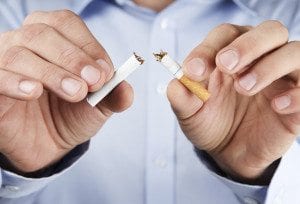 Thanks to an aggressive campaign of public service announcements and the mandatory Surgeon General’s warning on packs of cigarettes, most people are now aware that smoking and using tobacco products has a negative impact on your overall health. The increased risk of developing lung cancer, breathing problems, chronic obstructive pulmonary disease (COPD) and other conditions are well documented and widely understood.
Thanks to an aggressive campaign of public service announcements and the mandatory Surgeon General’s warning on packs of cigarettes, most people are now aware that smoking and using tobacco products has a negative impact on your overall health. The increased risk of developing lung cancer, breathing problems, chronic obstructive pulmonary disease (COPD) and other conditions are well documented and widely understood.
However, what is not as well-known that smoking and tobacco products are specifically bad for your oral health — the health of your mouth and teeth. Dr. Michael Mulkey of Lost Mountain Dental at Due West in Marietta, GA would like to elaborate on the dangers of smoking and tobacco use for your smile.
How Does Tobacco Affect My Teeth?
Smoking cigarettes constricts blood vessels and the nicotine in them reduces white blood cell counts, slowing down your natural ability to heal and causing your teeth to wear down faster. Additionally, cigars, chewing tobacco, snuff and unprocessed tobacco leaves (used as cigar wrappers) all contain tiny abrasive particles that damage the enamel of your teeth if used regularly.
Smoking and tobacco use also hinder the effectiveness of many dental treatments. Because the effects of smoking on your mouth include reduced blood flow, increased bacteria and inflammation, complications can arise when healing from dental procedures. These issues can make it difficult to replace lost teeth using restorative dental procedures.
For example, implants and bridges might not be an option for a tobacco user because your surrounding teeth and jawbone may have deteriorated from infection or decay and aren’t strong enough to support these procedures. Research shows that due to slow healing and weaker jawbone tissue, the implant failure rate for smokers was almost 16 percent, compared to just 1.4 percent in the nonsmoking population.
Treating gum disease is harder.
Research shows that tobacco users are twice as likely to develop gum disease than non-smokers. Furthermore, since the nicotine in tobacco stunts your immune system’s ability to fight infection, using tobacco products can turn a simple infection into an abscess or even sepsis. Additionally, nicotine also stunts the growth of blood vessels, which means less blood flow to the gum tissues which slows healing after oral surgery.
What about chewing tobacco?
Smokeless tobacco (also known as snuff or chewing tobacco) is a primary cause of mouth, lip, tongue and pancreatic cancer. Like cigarettes, chewing tobacco contains at least 28 cancer-causing chemicals. Issues caused by smokeless tobacco include:
- Risk for cancer of the voice box, esophagus, colon and bladder due to swallowing toxins in the juice created by chewing.
- Irritation of your gums, which can lead to gum (periodontal) disease.
- Increased risk of tooth decay as sugar is often added to enhance the flavor of chewing tobacco.
- Tooth sensitivity and erosion due to sand and grit from smokeless tobacco wearing down teeth.
Restoring Your Teeth After Smoking
For more information or for help restoring your teeth from the destruction caused by tobacco use, schedule with Dr. Mulkey of Lost Mountain Dental at Due West in Marietta, GA by calling (678) 212-1280 or schedule online today.
